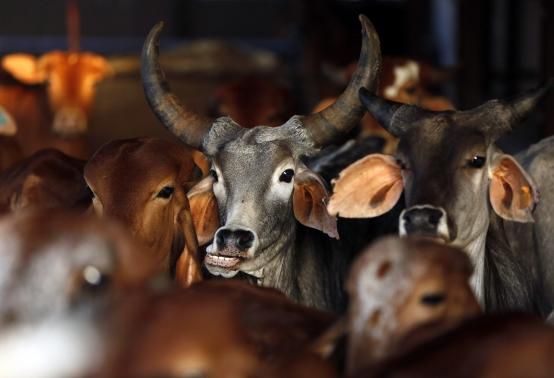 Justifying its controversial ban on slaughter of cows, bulls and bullocks and consumption of their meat, Maharashtra government on Monday told the Bombay high court there is a need to protect and preserve these animals as the state’s economy is still predominantly agricultural.
Justifying its controversial ban on slaughter of cows, bulls and bullocks and consumption of their meat, Maharashtra government on Monday told the Bombay high court there is a need to protect and preserve these animals as the state’s economy is still predominantly agricultural.
The government, in an affidavit, said the ban introduced under Maharashtra Animal Preservation (Amendment) Act, which has received presidential assent, was not violative of the fundamental rights of citizens to have food of their own choice.
The affidavit was filed by Chitrakala Suryavanshi, deputy secretary, animal husbandry, agriculture, dairy development and fisheries development department, in response to a bunch of petitions challenging the ban which came into force early this month.
The petitions have challenged only Sections 5 (d) and 9 (a) of the Act, which prohibits possession and consumption of meat of cow, bulls and bullocks even if the animals have been slaughtered outside Maharashtra. According to the petitions, this puts a ban on import of meat.
The government has said that Sections 5 (d) and 9 (a) do not suffer from either lack of legislative competence or violation of any fundamental rights.
“Section 5 (d) is essential so as to prevent practical difficulties in the administration of law. It would otherwise be very difficult to implement the policy of the Act,” the affidavit said.
“It is considered that the economy of Maharashtra was still predominantly agricultural and cow progeny is its backbone. Bulls and bullocks are useful not only as draught animal but also for agricultural purposes and breeding. They never cease to be useful as their dung is also a form of rich manure. Considering their usefulness, it was felt necessary to preserve and protect this cow progeny, including bulls and bullocks,” the affidavit stated.
Refuting the petitioners’ contention that the Maharashtra government cannot prohibit import of meat of animals slaughtered outside the state, the affidavit said “having received assent from the president of India, the law made by the state legislature would prevail over existing law.”
It further claimed the Act was introduced to give effect to several articles mentioned in the Constitution.
“Article 51- A (g) imposes fundamental duty on the citizen to protect and improve the natural environment, including forests, lakes, rivers and wildlife, and to have compassion for living creatures.”








